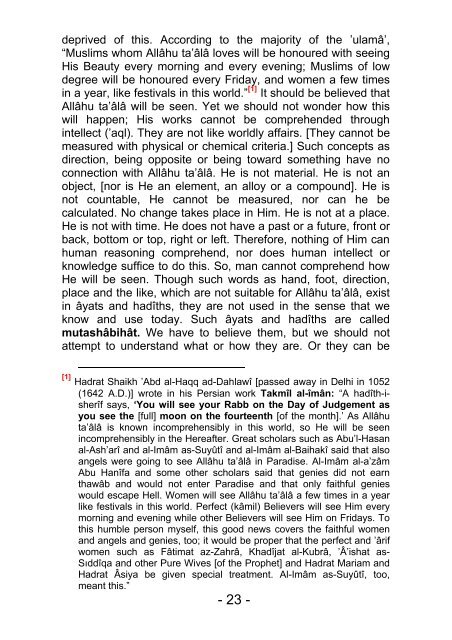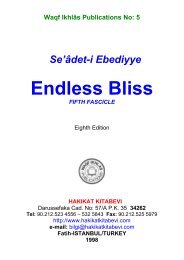8-Belief and Islam - Hakikat Kitabevi
8-Belief and Islam - Hakikat Kitabevi
8-Belief and Islam - Hakikat Kitabevi
You also want an ePaper? Increase the reach of your titles
YUMPU automatically turns print PDFs into web optimized ePapers that Google loves.
deprived of this. According to the majority of the ’ulamâ’,<br />
“Muslims whom Allâhu ta’âlâ loves will be honoured with seeing<br />
His Beauty every morning <strong>and</strong> every evening; Muslims of low<br />
degree will be honoured every Friday, <strong>and</strong> women a few times<br />
in a year, like festivals in this world.” [1] It should be believed that<br />
Allâhu ta’âlâ will be seen. Yet we should not wonder how this<br />
will happen; His works cannot be comprehended through<br />
intellect (’aql). They are not like worldly affairs. [They cannot be<br />
measured with physical or chemical criteria.] Such concepts as<br />
direction, being opposite or being toward something have no<br />
connection with Allâhu ta’âlâ. He is not material. He is not an<br />
object, [nor is He an element, an alloy or a compound]. He is<br />
not countable, He cannot be measured, nor can he be<br />
calculated. No change takes place in Him. He is not at a place.<br />
He is not with time. He does not have a past or a future, front or<br />
back, bottom or top, right or left. Therefore, nothing of Him can<br />
human reasoning comprehend, nor does human intellect or<br />
knowledge suffice to do this. So, man cannot comprehend how<br />
He will be seen. Though such words as h<strong>and</strong>, foot, direction,<br />
place <strong>and</strong> the like, which are not suitable for Allâhu ta’âlâ, exist<br />
in âyats <strong>and</strong> hadîths, they are not used in the sense that we<br />
know <strong>and</strong> use today. Such âyats <strong>and</strong> hadîths are called<br />
mutashâbihât. We have to believe them, but we should not<br />
attempt to underst<strong>and</strong> what or how they are. Or they can be<br />
[1] Hadrat Shaikh ’Abd al-Haqq ad-Dahlawî [passed away in Delhi in 1052<br />
(1642 A.D.)] wrote in his Persian work Takmîl al-îmân: “A hadîth-isherîf<br />
says, ‘You will see your Rabb on the Day of Judgement as<br />
you see the [full] moon on the fourteenth [of the month].’ As Allâhu<br />
ta’âlâ is known incomprehensibly in this world, so He will be seen<br />
incomprehensibly in the Hereafter. Great scholars such as Abu’l-Hasan<br />
al-Ash’arî <strong>and</strong> al-Imâm as-Suyûtî <strong>and</strong> al-Imâm al-Baihakî said that also<br />
angels were going to see Allâhu ta’âlâ in Paradise. Al-Imâm al-a’zâm<br />
Abu Hanîfa <strong>and</strong> some other scholars said that genies did not earn<br />
thawâb <strong>and</strong> would not enter Paradise <strong>and</strong> that only faithful genies<br />
would escape Hell. Women will see Allâhu ta’âlâ a few times in a year<br />
like festivals in this world. Perfect (kâmil) Believers will see Him every<br />
morning <strong>and</strong> evening while other Believers will see Him on Fridays. To<br />
this humble person myself, this good news covers the faithful women<br />
<strong>and</strong> angels <strong>and</strong> genies, too; it would be proper that the perfect <strong>and</strong> ’ârif<br />
women such as Fâtimat az-Zahrâ, Khadîjat al-Kubrâ, ’Â’ishat as-<br />
Sıddîqa <strong>and</strong> other Pure Wives [of the Prophet] <strong>and</strong> Hadrat Mariam <strong>and</strong><br />
Hadrat Âsiya be given special treatment. Al-Imâm as-Suyûtî, too,<br />
meant this.”<br />
- 23 -











